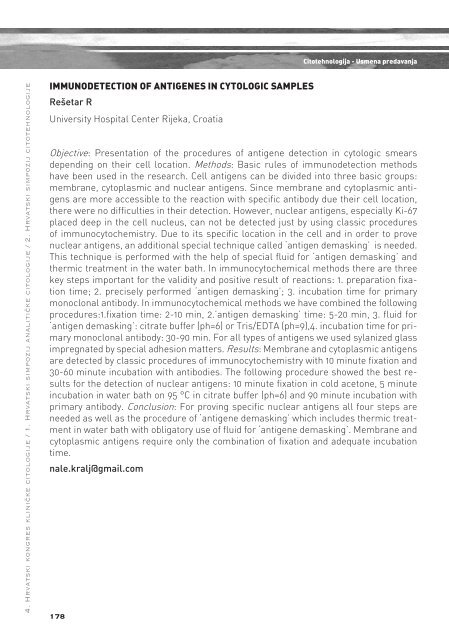4. Hrvatski kongres kliniËke citologije 4th Croatian Congress ... - Penta
4. Hrvatski kongres kliniËke citologije 4th Croatian Congress ... - Penta
4. Hrvatski kongres kliniËke citologije 4th Croatian Congress ... - Penta
Create successful ePaper yourself
Turn your PDF publications into a flip-book with our unique Google optimized e-Paper software.
<strong>4.</strong> <strong>Hrvatski</strong> <strong>kongres</strong> <strong>kliniËke</strong> <strong>citologije</strong> / 1. <strong>Hrvatski</strong> simpozij analitiËke <strong>citologije</strong> / 2. <strong>Hrvatski</strong> simpozij citotehnologije<br />
IMMUNODETECTION OF ANTIGENES IN CYTOLOGIC SAMPLES<br />
Rešetar R<br />
University Hospital Center Rijeka, Croatia<br />
Objective: Presentation of the procedures of antigene detection in cytologic smears<br />
depending on their cell location. Methods: Basic rules of immunodetection methods<br />
have been used in the research. Cell antigens can be divided into three basic groups:<br />
membrane, cytoplasmic and nuclear antigens. Since membrane and cytoplasmic antigens<br />
are more accessible to the reaction with specific antibody due their cell location,<br />
there were no difficulties in their detection. However, nuclear antigens, especially Ki-67<br />
placed deep in the cell nucleus, can not be detected just by using classic procedures<br />
of immunocytochemistry. Due to its specific location in the cell and in order to prove<br />
nuclear antigens, an additional special technique called ‘antigen demasking’ is needed.<br />
This technique is performed with the help of special fluid for ‘antigen demasking’ and<br />
thermic treatment in the water bath. In immunocytochemical methods there are three<br />
key steps important for the validity and positive result of reactions: 1. preparation fixation<br />
time; 2. precisely performed ‘antigen demasking’; 3. incubation time for primary<br />
monoclonal antibody. In immunocytochemical methods we have combined the following<br />
procedures:1.fixation time: 2-10 min, 2.’antigen demasking’ time: 5-20 min, 3. fluid for<br />
‘antigen demasking’: citrate buffer (ph=6) or Tris/EDTA (ph=9),<strong>4.</strong> incubation time for primary<br />
monoclonal antibody: 30-90 min. For all types of antigens we used sylanized glass<br />
impregnated by special adhesion matters. Results: Membrane and cytoplasmic antigens<br />
are detected by classic procedures of immunocytochemistry with 10 minute fixation and<br />
30-60 minute incubation with antibodies. The following procedure showed the best results<br />
for the detection of nuclear antigens: 10 minute fixation in cold acetone, 5 minute<br />
incubation in water bath on 95 °C in citrate buffer (ph=6) and 90 minute incubation with<br />
primary antibody. Conclusion: For proving specific nuclear antigens all four steps are<br />
needed as well as the procedure of ‘antigene demasking’ which includes thermic treatment<br />
in water bath with obligatory use of fluid for ‘antigene demasking’. Membrane and<br />
cytoplasmic antigens require only the combination of fixation and adequate incubation<br />
time.<br />
nale.kralj@gmail.com<br />
178<br />
Citotehnologija - Usmena predavanja


